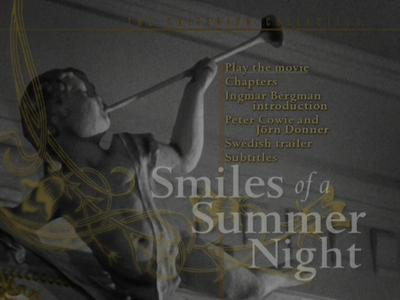
For those of you keeping track, if you really want to control a man, you need to take charge of three things: his heart, his words, and his loins. This, at least, is the truth according to the play within the film Smiles of a Summer Night and spoken in character by blonde actress Desirée Armfeldt, who herself is played by blonde actress Eva Dahlbeck. It's one of many miniature or mirror reflections within the grander design, each small refraction reflecting on the bigger picture, like Russian dolls or concentric circles within a whirlpool. Ah, such is love.
Smiles of a Summer Night is the 1955 romantic comedy from famed Swedish director Ingmar Bergman. Most often typecast as a sadsack, Bergman's sense of humor is regularly forgotten. (Dude, there's a fart joke in Fanny and Alexander!) The writer and director put Smiles of a Summer Night together when he needed a big hit, and hit he did. The film took a special prize at Cannes the following year, and an illustrious cinema career followed.
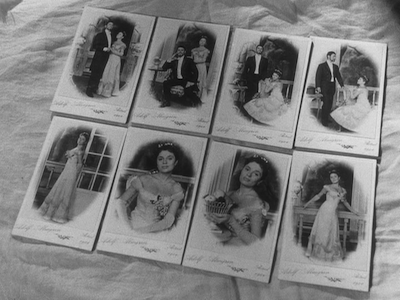
The story of Smiles of a Summer Night takes place over a series of days in the late-19th/early-20th century, culminating in an all-night party where the machinations of the previous events come together. It's a light comedy of errors, a semi-farcical love story with many players. Desirée loves Fredrik, but Fredrik's married to Anne, but Anne won't give up her virginity and rumor has it that Anne is getting with Fredrik's son, Henrik, who may or may not know that Fredrik and Desirée once had a thing. Meanwhile, Henrik, who is studying to be a priest, is lusting after the maid Petra, who advises Anne, and who also thinks Fredrik is kind of dreamy. Desirée is having an affair with Count Magnus, who is in an open-relationship with his wife Charlotte, but like most open relationships, the openness is one-sided. Charlotte is friends with Anne and so is caught between her devotion to a pal and her husband's jealousy over his mistress' old flame returning to her life. Meanwhile, Fredrik knows what he wants least of anybody.
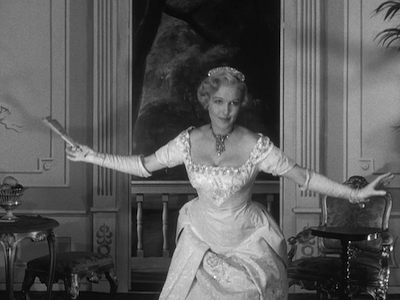
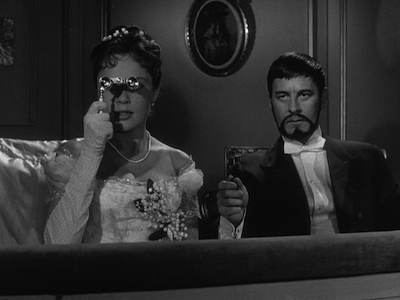
That description feels like it should be delivered in one giant breath, spoken as fast as possible so as best to communicate the madness of the soap opera. One is also tempted to break it down into a bawdy joke: the lawyer and the soldier fight over the actress, while the virgin and the priest consort with the hired help, etc. Bergman does similar himself a couple of times, using a cuckoo clock as a transitional connector in later scenes. The clock doesn't have an actual cuckoo, but instead a parade of carved figures pursuing each other in a circle as the hour is struck. There is the soldier and the maiden and the priest...and because this is Bergman, the Grim Reaper--though this too is a joke, a foreshadowing wink toward the film's final scenes when rivals engage in a dangerous game. It's another microcosm, the image within the image.
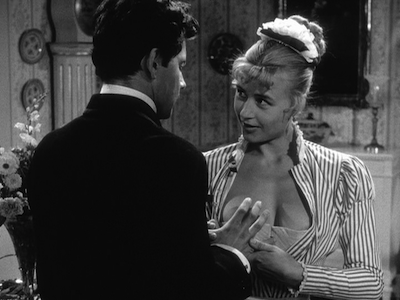
The final night serves as one of these miniature recreations, as well. The big party takes place at the country estate of Desirée's family. The actress has gathered her friends and their lovers in one final attempt to win back Fredrik (Gunnar Bjornstrand). She has made a pact with Charlotte (Margit Carlqvist) to enter into a mutual scheme to convince Magnus (Jarl Kulle) that the marriage bed is where he really wants to be, and with Fredrik distracted, maybe Anne (Ulla Jacobsson), who is secretly aware of her own husband's previous dalliance with Desirée after his first wife died, will finally enter into a joint release of carnal passions with her stepson (Björn Bjelvenstam). The whole thing actually takes on shades of A Midsummer Night's Dream when Desirée's mother (Naima Wifstrand) offers her guests a magical potion--wine that contains a drop of a woman's breast milk and a horse's semen--that is said to work as an elixir of love. It's probably just a placebo, but it definitely casts its spell.
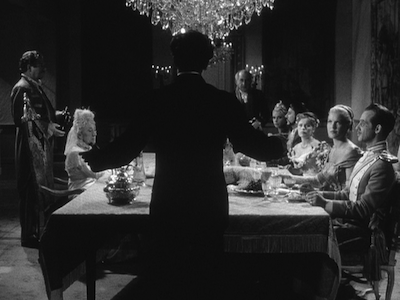
The movie's miniature summary comes that night from a different source, however. Petra (Harriet Andersson) has come along on the jaunt to serve Anne over the weekend, and she is paired off with the estate's groom, a jovial fellow named Frid (Ake Fridell). Frid immediately sets his sight's on the sexy blonde. It's a pairing of convenience, in a way, they are both workers, but it's also an intentional commentary on class. Bergman has set up that a major theme of the movie is how people love one another and how important the question of love is to each, and he notes multiple divides between different types of people. The most natural divide, obviously, is men and women, but social position also makes a difference. A lawyer approaches his sex differently than a soldier, just as Magnus' servant, who arrives with his master in an early automobile, views transportation differently than Frid, who takes care of the horses and drives his boss' carriage. Frid's flirtation with Petra is the most free and easy of any in Smiles of a Summer Night. The gregarious butler can chase and tease the lusty maid with as much abandon as he can muster. They aren't bound by the same restrictive mores as their employers. The game for them is really about play, while for the others, it's a more complex arrangement full of complicated rules, strategy, penalties, and of course, secrets and misdirection. There is even a difference in how the actors get to perform their roles. Andersson and Fridell are more physical and loose, and clearly more fun, whereas their counterparts are buttoned-up, starchy, and at times, comically emo.
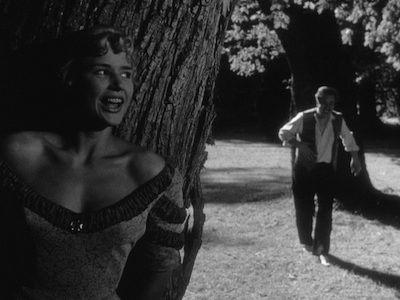
But again, that mini-version: Frid explains the cycle of a summer night. It has three smiles. The first starts at midnight, and it's when young lovers surrender to their passions; the second is for the jesters and the literal fools, those undone by love or undoing it; the third and final, occurring in the wee hours before the new day, is for "the sad and dejected, for the sleepless and lost souls, for the frightened and the lonely." It's a relationship in 8 hours: the blossoming romance, the rash action, and the consequences. One can see this theory reflected in the three-act structure of Bergman's movie, as well: the introduction of all the relationships, the stupid things they do that cause them to begin unraveling, and the disconnect apparent at the party, when none of the lovers are with their most desired. Once the night is over and the sun rises, things are fixed, the lovers can return to the arms of their intended. Even Frid and Petra have found something by dawn's first gleamings.
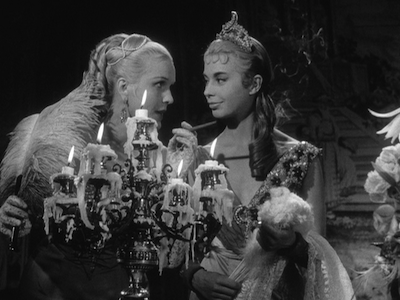
I should note, that while Smiles of a Summer Night has farcical elements and some truly funny lines--and even a little bit of slapstick (Fredrik ends up in a puddle, and then a frilly night shirt)--it's not a knee slapper. In fact, as it starts, you might not realize that it's a comedy at all. Bergman begins as if it were an erudite period drama. As the film progresses, he tweaks the conventions as one might tweak the nose of anyone taking himself too seriously, and lets the humor of the situation come out on its own. His characters, as so many people do in real life, become their own parodies. Our own selfish tendencies allow us to wallow in our moods and feelings until they become exaggerated, and if we can't laugh at ourselves at such times, don't worry, there will be plenty around to laugh in our stead.
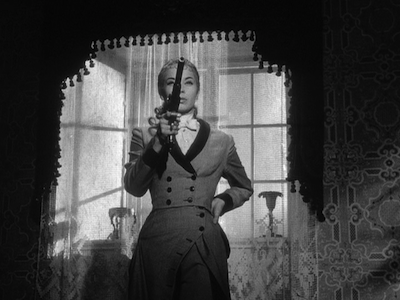
The one exception is Desirée. The actress is always in control, and Eva Dahlbeck, besides being physically gorgeous, gives the character an attractive internal confidence. She stands up for herself and fights for what she wants, but she's also good humored. Her laughing at Fredrik in the puddle seems so spontaneous--the tones of the chortle are full and genuine. Perhaps this is Bergman having his own laugh, subverting the notion of theater people as flighty and vain, getting a little back for his own. As a filmmaker, he's certainly in control. It's not the artist that is flaky, but all the folks with supposedly respectable careers. Maybe that's the punchline of the joke. The actress orchestrates the whole thing, and the priest, soldier, and lawyer are defenseless in her presence.
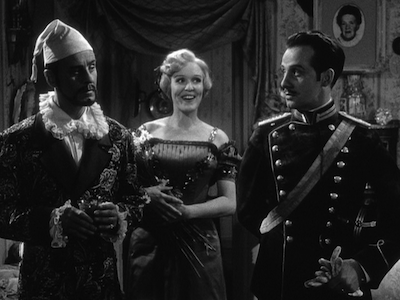
For a complete rundown on the special features, read the full review at DVDTalk.
Screen captures are from the DVD, not the Blu-Ray.

No comments:
Post a Comment